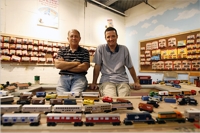| |||
|
Sue Dennison, co-owner of Roy Toy, which is based in East Machias, Me., said orders were up about 25 percent over the last several weeks. “I used to get probably two e-mails a week inquiring about U.S.-made toys,” she said. “Now I’m getting four or five a day.” With so many mass-produced toys being made in China, most American-made toys are sold over the Internet or in independent toy stores that tend to be more expensive than major retail chains. Indeed, many neighborhood toy stores promote the fact that their toys are not mass produced but rather handmade by American manufacturers or imported from European toy makers. But those stores represent a small fraction of the toys that are sold. Cliff Annicelli, editor of Playthings, a toy industry trade publication, estimated that specialty toys represent about 5 percent of the overall toy business in the United States, which was $22 billion in 2006. He pointed out that even small toy stores may carry as many Chinese-made toys as larger retailers. Store owners, however, are likely to have better knowledge about the quality and origin of their toys than employees of large retail chains. At Kidding Around, a toy store in Manhattan, Karla Perez, the manager, said the recalls of Chinese-made toys have had little impact on the store’s business. She said her store has a loyal customer base and does not necessarily draw those who shop at retail chains like Toys “R” Us. Source: New York Times |
